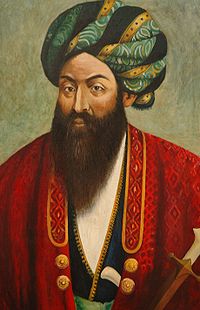Jan-Fishan Khan
| Jan-Fishan Khan | |
|---|---|
 |
|
| Born | ? Paghman, Afghanistan |
| Died | 1864 Sardhana, India |
| Nationality | Afghan |
| Occupation | Warlord and Nawab (noble) |
| Children | Nawab Muhammad Ali Shah Sardar Bhadur Mir Khan |
| Parent(s) | Sayed Qutubuddin Khan |
| Relatives | Shah family |
Sayyid Muhammed Shah, better known by his title as Jan-Fishan Khan, was a 19th-century Afghan warlord. He participated in the First Anglo-Afghan War (1839–42) and the Indian Rebellion of 1857, and on both occasions, he supported the British. For his services to the British, Khan was granted the estate of Sardhana and is the forefather of the Nawabs of Sardhana. He is an ancestor of Naseeruddin Shah, the Indian actor, and of Zamiruddin Shah, vice-chancellor of Aligarh Muslim University.
Jan-Fishan Khan was the son of an Afghan noble, Sayyid Qutubuddin Khan, of Paghman, the family's ancestral home in Afghanistan. His family has historically claimed descent from Ali ar-Ridha, the eighth Imam, through Najmuddin Kubra and the Arab Sufi Syed Bahaudin Shah.
In the First Anglo-Afghan War, Sayyid Muhammed Shah, also known to the British as the "Laird of Pughman", supported Shah Shuja and the British Army against other Afghan forces, apparently in order to honour a family allegiance to Shah Shuja. In 1840, he was awarded the title "Jan-Fishan Khan" by Shah Shuja for his support. According to writer James Moore, the title means "The Zealot" (however this is a misunderstanding of the meaning of the Persian idiom which can mean "zealous" in the sense of 'ready to sacrifice one's life', as it is defined in Steingass). One of Jan-Fishan Khan's descendants Saira Shah has correctly explained that this nom de guerre translates literally as "scatterer of souls". Shah recounts that the appellation has a double meaning: first, that of a warlord scattering the souls of his enemies, and second, one based on a Sufi couplet describing the supplicant's devotion to God:
...
Wikipedia
